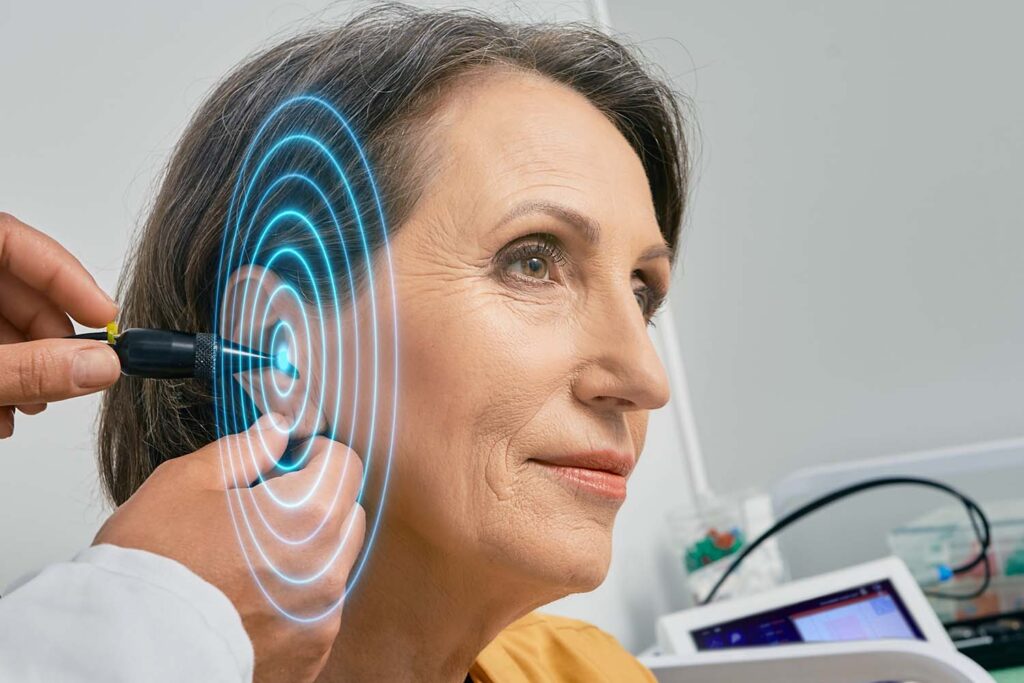
Call Us
Call to national mobile network
Write
Find Us
Call Us
Call to national mobile network
Write
Find Us
Call Us
Call to national mobile network
Write
Find Us
Gain precise insights into your ear’s natural protective reflex with our tailored and comprehensive Acoustic Reflex Latency (ARL) assessment.

The test
The Acoustic Reflex Latency test is an advanced hearing assessment that measures how quickly a tiny muscle in your middle ear (the stapedius) reacts to loud sounds. In technical terms, it records the time interval between the introduction of a high-intensity sound and the onset of the stapedius muscle’s reflex contraction. Essentially, this test gauges the speed and efficiency of your ear’s protective reflex, which is a direct reflection of how well the auditory nerve and brainstem pathways are functioning. By mapping the latency (delay) of this reflex, audiologists gain insight into the integrity of your auditory system beyond the inner ear. The ARL Test complements standard hearing exams by focusing on the neural aspects of hearing – offering a more complete picture of your auditory health.
impact
Hearing is complex, and not all difficulties stem from the ear’s sound-detecting cells. Some issues originate along the auditory nerve or in the brainstem. The ARL Test is essential when we need to distinguish between a problem in the cochlea (inner ear) and one in the nerve pathways beyond it. It serves as a sensitive indicator for detecting retrocochlear lesions – in other words, problems like growths or nerve damage beyond the cochlea. Research has shown that a prolonged acoustic reflex latency (a slower reflex response) can be a highly specific early warning sign of disorders affecting the auditory nerve or brainstem. For example, an unusually delayed reflex might signal a small acoustic neuroma (a benign auditory nerve tumour) or other neural issue even before other symptoms become obvious.
detailed insights
At AudioCare, we don’t just administer tests – we care for you as a whole person. If the Acoustic Reflex Latency Test is indicated for your hearing evaluation, our team will integrate it seamlessly into your appointment. Here’s what you can expect: our qualified audiologist will gently place a small probe in your ear (much like during a standard middle-ear test) to deliver the sound stimulus and measure your ear’s response. You’ll hear a series of tones or buzzing sounds; none of these are harmful, and while they may be loud, they last only moments. The entire ARL measurement is very brief – typically a matter of minutes – and completely painless. Throughout the process, we prioritize your comfort: we’ll ensure the eartip fits comfortably, explain each step before it happens, and check that you’re at ease. If at any point you need a break or have a concern, we pause and address it. Your well-being is our top priority.
Start Your Journey to Better Hearing: Choosing AudioCare for your Acoustic Reflex Latency testing means choosing precision, comfort, and a truly personalised experience. Our comprehensive approach ensures that whether you’re dealing with subtle, unexplained hearing difficulties or simply seeking reassurance about your ear’s reflexes, you will receive clear answers and compassionate support. We combine clinical excellence with genuine human understanding, so you leave our clinic with both clarity and confidence in your care plan.
Don’t wait to take control of your hearing health. Book your appointment today and take a proactive step towards maintaining and improving your hearing. With AudioCare by your side, you’ll have expert guidance and heartfelt care at every turn on the path to better hearing.
Initial Consultation
At first, an anamnesis is carried out by a health professional with the patient, which is intended to be an initial point in the diagnosis.
Diagnosis
Primary and complementary tests are carried out to diagnose the type of hearing loss that will explain why it is difficult to hear.
Recommendation
According to the results of these tests, if hearing loss is proven, a hearing aid will be recommended, which may vary in type and model.
Testimonials
Sehr freundliche Bedienung und Hilfreiche Betreuung. Mir wurde mein Hörgerät trotz anderen Fabrikates repariert. Sprachliche Verständigung auch in Deutsch möglich. Kann ich nur empfehlen.
Excelentes profissionais!
Robert cleared my ear wax. Perfect
Great physiotherapist. My Family has been going there for years.
My husband is very pleased with his new ears.
Extremely knowledgeable and friendly people gave fantastic advice & reasonably priced.
Very professional service. Kate was very pleasant. Unfortunately too expensive for my budget.
Super Service. Sehr gute Betatung
Uitstekende manueel therapeut.
Uma simpatia e com muito conhecimento do assunto . Fácil estacionar e gratuito.
Great service
Professional Advice
Whether you’re exploring our bespoke services, our approach, or how we can elevate your hearing experience, here are answers to the questions we’re asked most often.
It measures the timing of your ear’s reflex response to sound – specifically, how quickly the stapedius muscle in your middle ear contracts when a loud sound occurs. In simple terms, it’s checking the speed of your ear’s protective “blink” reflex. This helps audiologists assess whether your auditory nerve pathways are transmitting signals efficiently (a fast, normal reflex) or if there’s any delay that might indicate an issue.
The ARL test is usually recommended in situations where we suspect a hearing problem beyond just the ear itself. If you have symptoms or test results suggesting an auditory nerve or brainstem issue – for example, difficulty understanding speech far worse than expected from your hearing test, or asymmetric hearing loss with normal imaging – an ARL test can provide further insight. It’s particularly useful for differentiating between inner ear (cochlear) hearing loss and nerve pathway (retrocochlear) disorders. In conditions like auditory neuropathy, where routine tests might be confusing, the ARL test can help confirm the diagnosis by revealing an absent or abnormal reflex response. Essentially, if your audiologist wants a closer look at how well the connection between your ear and brain is working, this test is a valuable tool.
Not at all. The ARL test is non-invasive and should not cause any pain. There are no needles or injections, and nothing painful will touch your ear. You’ll feel a soft earplug-like probe in your ear – similar to what’s used in a standard tympanometry or ear pressure test – and you will hear a series of tones. Some sounds may be loud for a brief moment, but they are tolerable and play only for a split second. Most people describe it as a strange buzzing or beeping and a slight pressure change in the ear, but not uncomfortable. Our audiologist will make sure you are at ease, and you can communicate any discomfort at any time. Overall, it’s a quick and gentle procedure.
You don’t need to fast, take medication, or do anything particular beforehand – just arrive with clean ears (excessive earwax can sometimes affect results, and if we find any, we might recommend a cleaning first). It’s also helpful to relax and sit still during the test. The ARL test itself is very quick; each ear only takes a few minutes to measure. If it’s being done as part of a larger hearing assessment, it will fit right into your appointment schedule. In total, expect your visit (including any other hearing tests) to be perhaps 30 minutes to an hour, but the portion for ARL is just a couple of minutes. After the test, the audiologist will immediately be able to share the results with you and explain what they mean. There’s no downtime or recovery – you can resume your normal activities right away.
Stay informed with the latest insights and innovations in hearing care, helping you enjoy life fully and with clarity in an ever-evolving world.



Typically replies within an hour
I will be back soon
Adding {{itemName}} to cart
Added {{itemName}} to cart